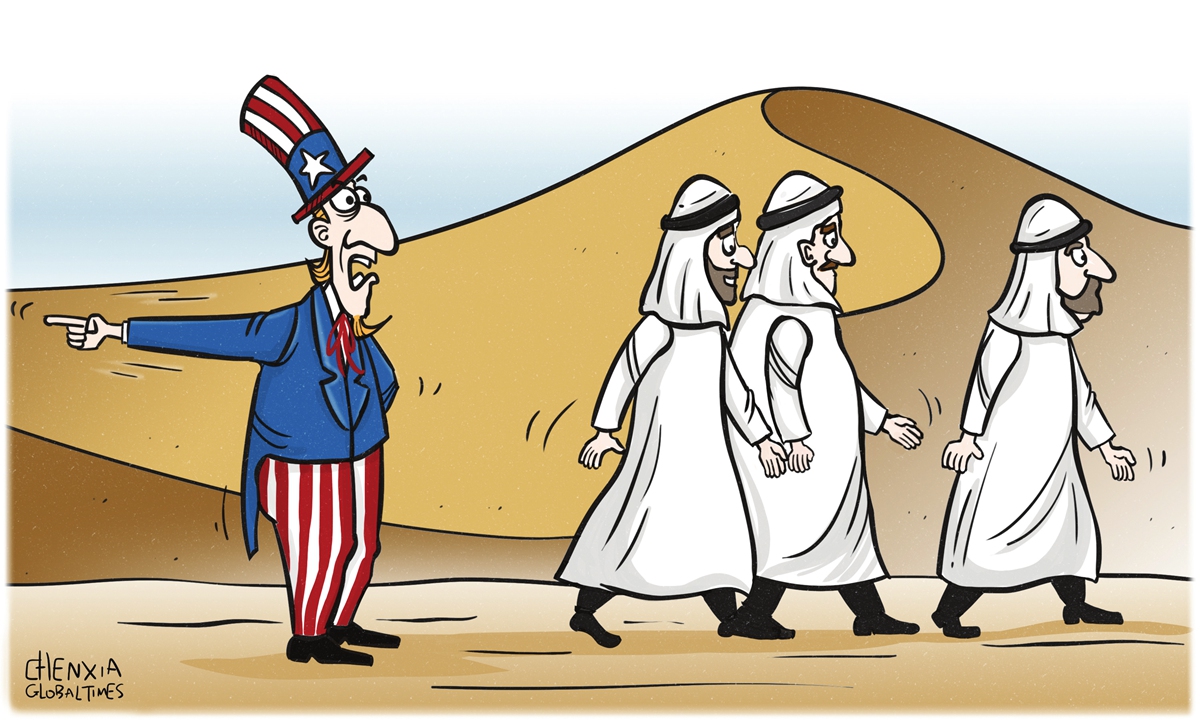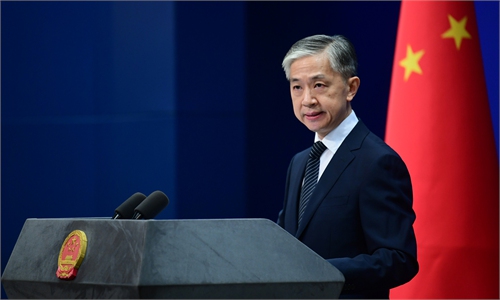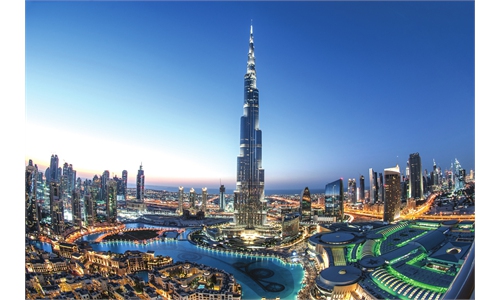
US Arab Illustration: Chen Xia/GT
Instead of building relations with Arab nations based on mutual goodwill, respect, trust, and benefit, some policymakers in the US establishment still have hegemonic delusions about the region, wishfully thinking that they can issue diktats to the Arabs. They erroneously believe that the Arab region is their playground and that they are entitled to having one-sided relations benefiting them mainly at the expense of the regional nations. This was clear in July when some US officials held a press conference to explain the objectives of Biden's trip to the Middle East, setting the diplomatic tone for the visit. However, they sounded out of touch with regional realities, unnecessarily and provocatively talking about claims of human right issues and political reforms, which Arab people viewed as a flagrant interference in their domestic affairs.
On the other hand, China has been investing in the region for long-term cooperation. China is now the largest trading partner and the No.1 foreign investor in the region. China has been patiently and strategically nurturing its relations with the regional nations. China's positive contribution to and expanding relations with the Arab world are welcomed by the Arab governments. China's wide-ranging and extending partnerships with regional players have enabled the Arab states to rethink their strategic relations, cushioning against hegemonic and destructive tendencies of their traditional partners.
People in the Middle East are the masters of their own fate, and it is them who should take the lead in the region's security affairs, Chinese State Councilor and Foreign Minister Wang Yi said at the second Middle East Security Forum held by the China Institute of International Studies in Beijing on Wednesday. Wang's remarks clearly showed the differences of how China and the US treated the regional countries.
China emphasizes peace-through-development approach, whereas the US prioritizes "human rights and democracy" subjects, which have increasingly annoyed many in the region. The US has lost a lot of political capital and goodwill in the region for its destructive role in the "Arab Spring." Regional leaders and people are too aware of some foreign powers' attempts to interfere in their internal affairs. Unlike some in the US establishment and their allied peers, the Chinese are neither ideological nor dogmatic in their approach to the region; they do not demand that the Arabs get rid of their values and import values that are foreign to their culture and society.
Both Arabs and Chinese support and uphold the UN Charter. At the UN Charter's core are the Five Principles of Peaceful Coexistence constantly embraced by both the Arabs and the Chinese: mutual respect for sovereignty and territorial integrity, mutual nonaggression, mutual non-interference in internal affairs, equality and mutual benefit, and peaceful coexistence.
The "Arab Spring" was essentially a covert hybrid war against the Arab world. One of its objectives was to hijack Arab sovereignty by replacing some Arab governments/leaders with those subservient to external powers. By facilitating and participating in the "Arab Spring" events, some US establishment members and their peers in allied countries thought they would entrench their regional and global leadership. However, little did they know that they were accelerating the decline of their regional and global influence.
Arab people and leaders are suspicious of the "New Middle East" agenda and the "Middle East Democracy" initiatives that have been pushed aggressively by some American officials, especially since 2003. More recently, there have been talks about the US/West not "relinquishing leadership" and "not leaving a vacuum in the region" as if the regional people had no agency in determining the depth and breadth of their relations with external powers. The issue is that some US officials still unreasonably see their relations with the Arab world through the outdated pre-Arab Spring prism of a unipolar world when the Arabs had some faith in the US' policies toward the region and the US had strong influence over the region.
Western media often portrays China's normal activities and exchanges with the Middle East as "challenges to US' dominance in the Middle East." Some US officials mistakenly view China's developing relations in the region as a zero-sum game. They hope that they will be able to convince the Arabs to sever or dampen their strategic relations with China and Russia in certain sectors. US President Joe Biden in July openly and publicly said that the US is "not going to leave a vacuum in the Middle East for Russia or China to fill."
However, it's the Arab leaders and people who decide the size of external powers' footprint in the region. The Arabs don't need foreigners to tell them how to view China and the Chinese people. The days of unipolarity are gone; the Arabs are committed to multipolarity, because they believe that this is the best and most stable global governance structure that will prevent or reduce unilateralism and hegemonic adventures, like those the world has seen over the last 20 years in various regions, but especially in the Arab world.
The Arabs have the strategic autonomy and sovereignty to decide the extent of their relations with other nations based on their national and regional interests. The days of the US issuing diktats to the regional states are long gone.
The article was compiled by Global Times reporter Yu Jincui based on an interview with Ebrahim Hashem, former adviser to the chairman of the Abu Dhabi Executive Office, an authority responsible for Abu Dhabi's long-term strategies, and Asia Global fellow at the Asia Global Institute at the University of Hong Kong. opinion@globaltimes.com.cn



